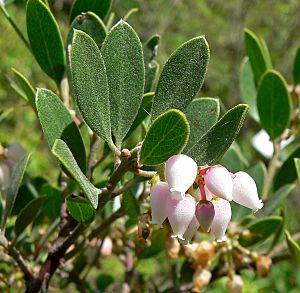Hooker's manzanita facts for kids
Quick facts for kids Hooker's manzanita |
|
|---|---|
 |
|
| ssp. franciscana | |
| Scientific classification | |
| Kingdom: | |
| (unranked): | |
| (unranked): | |
| (unranked): | |
| Order: | |
| Family: | |
| Genus: | |
| Species: |
A. hookeri
|
| Binomial name | |
| Arctostaphylos hookeri G.Don
|
|
Arctostaphylos hookeri is a type of plant called a manzanita. Its common name is Hooker's manzanita. These plants are usually low-growing shrubs. They are known for their pretty flowers and red fruits.
Contents
What Hooker's Manzanita Looks Like
Hooker's manzanita is a small shrub. It can look different depending on its specific type. These plants often grow low to the ground, like a mat. They can also form small bushes.
They have small green leaves. Their flowers grow in thick bunches. These flowers can be white or pink. After the flowers, the plant grows shiny, egg-shaped, or round red fruits. These fruits are called drupes.
Where Hooker's Manzanita Grows
The Arctostaphylos hookeri shrub only grows in California. This means it is endemic to California. Its natural home stretches from the coast near the San Francisco Bay Area. It also grows down to the Central Coast.
Different Types of Hooker's Manzanita
Within the Arctostaphylos hookeri species, there are several different types. These are called subspecies. They are all very similar but have small differences.
- A. h. franciscana - Franciscan manzanita
This subspecies was named by Alice Eastwood. It is native to the city of San Francisco. For a while, people thought it had disappeared from the wild. But then, in 2009, one plant was found!
Less than a month later, Caltrans moved this special plant. They moved it to make space for a road project. The U.S. Fish and Wildlife Service officially listed the Franciscan manzanita as an endangered species in 2012. This means it is at high risk of disappearing forever.
The National Park Service and Golden Gate National Parks Conservancy are working to help this plant. They are trying to mix pollen from the preserved plant. Their goal is to grow more plants. Then they can put them back into the wild.
- A. h. hearstiorum - Hearst's manzanita
This type of manzanita grows naturally in San Luis Obispo County.
- A. h. hookeri
This subspecies grows in the Santa Cruz Mountains and nearby areas.
- A. h. montana - Mt. Tamalpais manzanita
This type is native to Mount Tamalpais.
- A. h. ravenii - Presidio manzanita
Only one plant of this subspecies exists at the Presidio of San Francisco. There are also a few copies of this plant grown from it. The United States government has listed it as an endangered species.
See also
 In Spanish: Arctostaphylos hookeri para niños
In Spanish: Arctostaphylos hookeri para niños
 | Janet Taylor Pickett |
 | Synthia Saint James |
 | Howardena Pindell |
 | Faith Ringgold |

